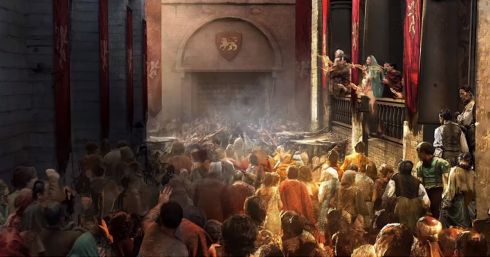Difference between revisions of "Agitate (speech)"
Tao alexis (talk | contribs) |
Tao alexis (talk | contribs) |
||
| Line 5: | Line 5: | ||
== Success == | == Success == | ||
| − | If the character's check is successful, the crowd will act as desired, within the limits imposed by their original concern. A crowd that is already angry with city officials or a group of authorities can be made to smash, loot, even attack officials they can find, or damage and destroy property. However, if the concern of the crowd was a matter of starvation, then the desired goal will be to get food. If the crowd sought justice, a lynching may be possible, but not raiding the local food stores. Within reason, the DM must make a judgment based on '''what the crowd wants''', and judge the character's proposed solution to that want within that context. | + | If the character's check is successful, the crowd will act as desired, within the limits imposed by their original concern. A crowd that is already angry with [[City Official|city officials]] or a group of authorities can be made to smash, loot, even attack officials they can find, or damage and destroy property. However, if the concern of the crowd was a matter of starvation, then the desired goal will be to get food. If the crowd sought justice, a lynching may be possible, but not raiding the local food stores. Within reason, the DM must make a judgment based on '''what the crowd wants''', and judge the character's proposed solution to that want within that context. |
== Consequences == | == Consequences == | ||
Revision as of 17:34, 15 October 2021
Agitate is a form of speech-giving enabled by the sage ability, Grassroots Movement. The character is empowered to gain the rapt attention of a crowd that is already in excess of 20 persons, that is already disgruntled or otherwise engaged in a discourse among themselves about some event. By shouting and giving an impromptu speech, the character has an excellent chance of "co-opting" the crowd, urging them to act as the character wishes.
When attempting to agitate, the character makes either an intelligence or wisdom check (player's choice). Failure will mean the speech failed to arouse the audience to action. The audience will shout back their refusal, whereupon the agitator can do nothing but give ground and give the opportunity to others. If there are no others, the audience will disperse and the incident will end. If there are any guards or watch present, they will recognize the character's failure and won't take action to disperse the crowd ... but the character may have reason to fear being arrested, depending on the character's intended purpose.
Success
If the character's check is successful, the crowd will act as desired, within the limits imposed by their original concern. A crowd that is already angry with city officials or a group of authorities can be made to smash, loot, even attack officials they can find, or damage and destroy property. However, if the concern of the crowd was a matter of starvation, then the desired goal will be to get food. If the crowd sought justice, a lynching may be possible, but not raiding the local food stores. Within reason, the DM must make a judgment based on what the crowd wants, and judge the character's proposed solution to that want within that context.
Consequences
Take note that depending on what action the character inspires, there will be consequences to the character if crimes or a revolution results. On the other hand, a crowd that is encouraged to raise a dam to stop a flooding river, or set out to fight for a cause, or begin a pilgrimage, would not represent a request that authorities would react against. In any case, the character seeking to agitate a mob should always be aware that someone is watching, and that the character's face will be recognized. It might do for the character to take steps to change their appearance before appearing publicly, or perhaps quickly escape the place and situation, or measure their intent against the anger it will cause.
Additionally, a wise character may see how to employ agitation as the appropriate speech for the appropriate moment, within the larger agenda of creating a sustained political or cultural movement.
See History
